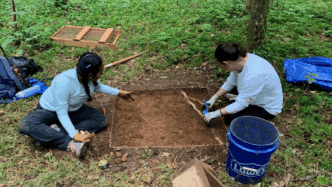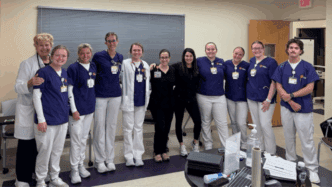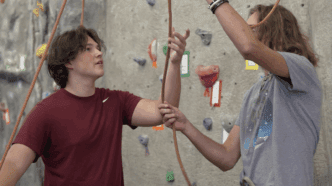Experiential learning is an integral part of the student experience in the College of Behavioral, Social and Health Sciences. Across each of the College’s seven academic departments, students experience hands-on learning opportunities on campus and in real-world settings to gain knowledge and skills pertinent to their degree program and future career goals.
Over the summer, Justin Williams, lecturer in the Department of Sociology, Anthropology and Criminal Justice, conducted an archaeological field school in partnership with the United States Forest Service, providing Clemson students with real-world experiences in cultural resource management.
Archaeology is the scientific study of past human life, behaviors and cultures through the recovery, analysis and interpretation of material remains. Archaeologists aim to understand how people lived, worked and interacted in the past and investigate everything from ancient cities and burial sites to stone tools. Fieldwork allows archaeologists to collect data to reconstruct cultural history and answer questions about human behavior, migration, technology and more.
“Unique experiential learning opportunities like our archaeological field school enable students to apply theoretical knowledge in real-world contexts,” said Williams. “Fieldwork and excavation cultivate technical proficiency, critical thinking and a deeper understanding of the discipline, resulting in more comprehensive and enduring learning outcomes.”
In collaboration with Forest Service agents, Williams, whose research area focuses on the lithic technology – or stone tools – of hunter-gatherers during the late Pleistocene and early Holocene periods, selected a site in northern Georgia with a historic component, dating back to the late 19th and early 20th centuries, with the presence of stone tools made by indigenous people of the past for the field school location.
Williams emphasized the importance of experiential learning – and fieldwork, specifically – as a tool to provide students with realistic day-to-day experiences related to their degree programs and desired professions. In addition to the academic benefits of experiential learning, he said the field school provided opportunities for physical participation in a variety of environments and weather conditions and prepared students to think critically and develop practical skills to be successful in the field.
“Archaeology can be physically demanding – fieldwork often involves long hours outdoors, sometimes in remote locations. But the excitement of discovery, the chance to solve historical puzzles and the opportunity to preserve cultural heritage are deeply rewarding,” said Williams. “Experiential learning is an essential part of the student experience and has long-term benefits for workforce development.”
As part of the course, students collected and transported stone tools to a lab on campus for analysis. In the lab, students removed debris, identified materials and classified tools before separating artifacts, ensuring proper storage and cataloging information for a formal report.
Williams is currently compiling data and findings from the field school into a report for the U.S. Forest Service to recommend whether the site should be included on the National Register of Historic Places.
The Department of Sociology, Anthropology and Criminal Justice is a part of the College of Behavioral, Social and Health Sciences. Established in July 2016, CBSHS is a 21st-century, land-grant college that combines work in nine disciplines – communication; nursing; parks, recreation and tourism management; political science; psychology; public health sciences; sociology, anthropology and criminal justice – to further its mission of “building people and communities” in South Carolina and beyond.








